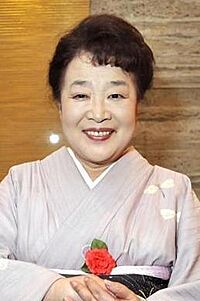Jun Henmi facts for kids
Quick facts for kids
Jun Henmi
辺見 じゅん |
|
|---|---|
 |
|
| Born | July 26, 1939 Mizuhashi, Toyama Prefecture, Japan |
| Died | September 21, 2011 (aged 72) Tokyo, Japan |
| Occupation | Writer, poet |
| Genre | Fiction, nonfiction |
| Notable works | Otoko-tachi no Yamato Shūyōjo kara Kita Isho |
Jun Henmi (辺見 じゅん, Henmi Jun, July 26, 1939 – September 21, 2011), whose real name was Mayumi Shimizu (清水 眞弓, Shimizu Mayumi), was a Japanese writer and poet. She was born in Mizuhashi, which is now part of Toyama City, Toyama Prefecture, Japan. Jun Henmi became well-known for her books, both fiction and nonfiction, that explored the lives of people affected by World War II. Her father, Gen'yoshi Kadokawa, was the person who started the famous publishing company Kadokawa Shoten. She was also the older sister of Haruki Kadokawa.
Jun Henmi's Life and Works
Jun Henmi wrote many important books during her career. She focused on telling stories about the impact of war on ordinary people. Her writing helped readers understand the human side of historical events.
Stories from World War II
One of Jun Henmi's most famous books is Yamato: The Last Battle (男たちの大和, Otoko-tachi no Yamato, lit. Yamato of Men). This book was published in 1983 and won the Nitta Jirō Culture Prize in 1984. It tells the story of the crew members of the Japanese battleship Yamato. The book describes their final journey during a mission called Operation Ten-Go. Later, in 2005, this book was made into a popular movie with the same title.
Another important work by Jun Henmi is Farewell Notes from a Prison Camp (収容所から来た遺書, Shūyōjo kara Kita Isho). This book came out in 1989. It is a nonfiction story about notes that a family received. These notes arrived 10 years after World War II ended. They were from a man who had died in a Russian prison camp in Siberia. This powerful book earned her two nonfiction literary awards.
Later Life
Jun Henmi continued to write and share her stories. She passed away on September 21, 2011. She collapsed at her home in a suburb of Tokyo and was 72 years old. Her works continue to be read and remembered for their focus on the human experience during wartime.
 | William Lucy |
 | Charles Hayes |
 | Cleveland Robinson |

